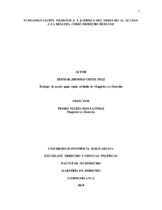Mostrar el registro sencillo del ítem
Fundamentación filosófica y jurídica del derecho al acceso a la belleza como derecho humano
| dc.contributor.advisor | Director. Osma Gómez, Pedro María | |
| dc.contributor.author | Ortiz Díaz, Edimar Jhossed | |
| dc.coverage.spatial | Bucaramanga | spa |
| dc.coverage.temporal | 2019 | |
| dc.date.accessioned | 2021-01-21T14:08:52Z | |
| dc.date.available | 2021-01-21T14:08:52Z | |
| dc.date.issued | 2019-07 | |
| dc.identifier.uri | http://hdl.handle.net/20.500.11912/7487 | |
| dc.description | 173p.: (pdf). | spa |
| dc.description.abstract | El director de orquesta Gustavo Dudamel afirma que existe un derecho a la belleza el cual ha sido realizado por iniciativas como la de El Sistema Nacional de Orquestas Juveniles e Infantiles de Venezuela, en este sentido, se hizo necesario fundamentar filosófica y jurídicamente el acceso a la belleza como un derecho para que los estados lo reconozcan y garanticen su protección jurídica. De esta forma, se inicia con la caracterización de los conceptos de belleza y derechos humanos. El primero es abordado desde las teorías estéticas y se entiende como una experiencia trascendental en la que se manifiesta la otredad, mientras que el segundo, es estudiado desde el iusnaturalismo, donde se plantea que su función es la realización plena de la naturaleza humana y se reconocen porque son inherentes a las personas, universales y absolutos. Así las cosas, el acceso a la belleza como un derecho se fundamenta en el iusnaturalismo de John Finnis y su teoría de los bienes básicos entre los cuales se encuentra la experiencia estética, la cual requiere necesariamente, del desarrollo de unas capacidades para garantizar un verdadero acceso, en este sentido, se acude al enfoque de las capacidades de Martha Nussbaum que busca establecer un mínimo de dignidad humana en cuanto a lo que las personas pueden ser y hacer. Este derecho significa capacitar para la contemplación y la creación de la belleza, como lo evidencia El Sistema mediante la música, lo que también significa capacitar para la libertad, es decir, capacitar para la acción, que Hannah Arendt considera la única forma de actividad exclusiva del ser humano, constituyendo una salida de ese mundo injusto y feo. | spa |
| dc.description.abstract | The orchestra conductor Gustavo Dudamel affirms that there is a right to beauty which has been realized by initiatives such as the National System of Youth and Children’s Orchestras of Venezuela. In this regard, it became necessary, philosophically and legally, substantiate the access to beauty as a right for the states to recognize and guarantee its legal protection. In this way, it begins with the characterization of the concepts of beauty and human rights. The first is approached from aesthetic theories and is understood as a transcendental experience in which otherness is manifested; while the second, is studied from iusnaturalism, and its function is the full realization of human nature and it is recognized because it is inherent to people, as something universal and absolute. Thus, access to beauty as a right is based on John Finnis\' iusnaturalism and his theory of the basic goods among which lies the aesthetic experience which necessarily requires the development of capabilities to ensure a real access. In this sense, the approach of Martha Nussbaum’s about capabilities seeks to establish a minimum of human dignity in terms of what people can be and do. This right means training for the contemplation and creation of beauty, as evidenced The System through music, which also means training for freedom, as training for action. This idea is supported by Hannah Arendt which considers beauty as the only exclusive activity of the human being as a way to get out of this unfair and ugly world. | eng |
| dc.format.mimetype | application/pdf | |
| dc.language.iso | spa | |
| dc.publisher | Universidad Pontificia Bolivariana | spa |
| dc.rights | Attribution-NonCommercial-NoDerivatives 4.0 International | * |
| dc.rights.uri | http://creativecommons.org/licenses/by-nc-nd/4.0/ | * |
| dc.subject | Derechos humanos | spa |
| dc.subject | Utopía | spa |
| dc.subject | Arte - Filosofía | spa |
| dc.subject | Iusnaturalismo | spa |
| dc.title | Fundamentación filosófica y jurídica del derecho al acceso a la belleza como derecho humano | spa |
| dc.type | Tesis de Maestría | spa |
| dc.publisher.department | Escuela de Derecho y Ciencias Políticas | spa |
| dc.publisher.program | Maestría en Derecho | spa |
| dc.rights.accessRights | openAccess | spa |
| dc.type.hasVersion | publishedVersion | spa |
| dc.description.sectional | Bucaramanga | spa |
| dc.identifier.instname | instname:Universidad Pontificia Bolivariana | spa |
| dc.identifier.reponame | reponame:Repositorio Institucional de la Universidad Pontificia Bolivariana | spa |
| dc.identifier.repourl | repourl:https://repository.unab.edu.co/ | |
| dc.description.degreename | Magíster en Derecho | spa |
Ficheros en el ítem
Este ítem aparece en la(s) siguiente(s) colección(ones)
-
Tesis de especialización, maestría y doctorado [1857]
Tesis de especialización, maestría y doctorado


